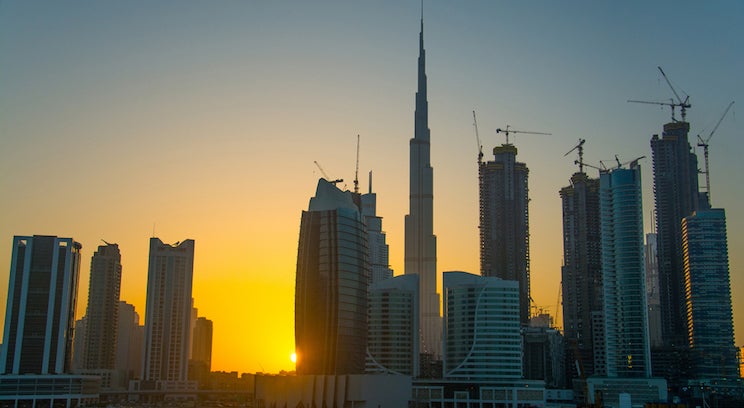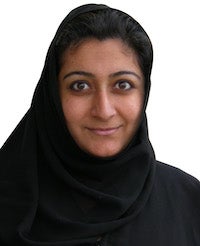
With a sprawling metropolis spanning over 1,500 square miles, a population of nearly three million people, and private-sector growth at its highest point in two years, Dubai is fast becoming a global epicenter for commerce and tourism. At the center of it all is Sahia Ahmad, general counsel of Dubai Tourism — a regulatory arm of Dubai’s government that works to encourage travel and international business. By working tirelessly to brand Dubai as a hub for technological innovation and economic opportunity, Dubai Tourism hopes to bring 20 million people to the city by 2020.
“We’re firmly committed to our 2020 goal — which represents the vision of His Highness Sheikh Mohammed bin Rashid Al Maktoum, vice president and prime minister of the UAE and the ruler of Dubai,” Ahmad says. “We want to make Dubai the number one destination for both leisure and business. For me, working in this particular role, which is linked to the city that I love and that is my home, is very important to me. I am quite proud of that.”
Raised in Dubai, Ahmad has witnessed the city grow into one of the largest financial centers in the Middle East. As a child, however, she recalls a time when Dubai was smaller in size: A time when the city was regionally focused and its infrastructure reflected a smaller economy. Due to oil prospects and increasing trade interests in the early 1970s, the city was thrust into the international spotlight and people from around the world began to flock to Dubai to witness its transformation.

Sahia Ahmad
“Dubai underwent extraordinary changes in a short period of time. Technological advancements and the influx of industry quickly made the city an important international location for the region,” Ahmad states.
As a result of the city’s budding international presence, Ahmad attended British preliminary schools, where global affairs immediately grabbed her attention. When asked about whether she always knew she wanted to become a lawyer, Ahmad responded with a resounding “yes.”
“I remember when I was about five years old, my grandfather told me that he was sure I would grow up to be a lawyer because I was so talkative. That stayed with me,” she asserts.
Having already studied in the British educational system, Ahmad decided to enroll in law school at the King’s College of London. While far from the comforts of home, she stresses the importance of the experience in solidifying her independence and professional ambition. At King’s College, Ahmad was exposed to cultural diversity, forward thinking, and innovation — qualities that she asserts prepared her for life in modern Dubai.
“I always knew that moving back to Dubai was what I wanted."
“Being on my own in such an international city gave me a global exposure that I had not known before. We had students from all over the world that shared new and diverse perspectives. I think it really set me up for what Dubai has now become,” Ahmad says.
Shortly after qualifying as a lawyer, she moved back to Dubai. Ahmad explains that while appreciative of her experience, she never faltered from her interest in practicing law in the city that she calls home. Back in Dubai, she signed on to work at Allen & Overy as an associate working on corporate and commercial matters in the Middle East.
“I always knew that moving back to Dubai was what I wanted. While being in London provided me with the global exposure that I needed, Dubai was an exciting place to be at the time,” says Ahmad.
Naturally, when she accepted her first in-house position, it would be for Dubai World — which is now one of the city’s largest investment companies, promoting commerce and trade internationally. At the company, Ahmad worked first-hand on significant transactions for the city — such as the global acquisition of P&O Ports by DP World, the construction of the famous Palm Island, and the creation of free zone regulations. “It was a fast paced period of my life, with lots of energy,” she explains.
However, faced with an opportunity to spearhead a new Dubai office at Reed Smith LLC, Ahmad briefly left the in-house profession for private practice. The allure of corporate counsel continued to beckon during her absence.
“I think being close to the business is really something that is dear to my heart, being able to directly see your impact on strategy and the results of the organization is very rewarding,” she notes.
After three years, Ahmad traveled to Abu Dhabi, where she would again accept a position as general counsel of Emirates Investment Authority — managing government assets for the United Arab Emirates (UAE) and working actively to implement governance structures, policies, and procedures. While she enjoyed the responsibility of working at the federal level, Ahmad soon found herself at a crossroads.
“At this point, I had a flavor for working in-house, I had a flavor for working in private practice. I had a flavor for working in Abu Dhabi and Dubai, but I wanted something different,” she explains.
The answer, as it turned out, was back at the starting line — working as general counsel for a company that centered around her passion for Dubai’s global image. In 2014, she would sign on to her current position as general counsel for Dubai Tourism, an opportunity she describes as a pivotal moment in her career.
"We want to make Dubai the number one destination for both leisure and business."
Dubai Tourism is separated into four main bodies that serve the following functions: (1) a regulatory sector that analyzes the city’s value proposition and plans growth; (2) a marketing sector that promotes Dubai as a destination globally; (3) a networking sector that manages events and festivals while setting retail policy; and (4) a tourist sector that serves to improve the standards of service across the tourism industry.
As a regulatory body with commercial objectives, Dubai Tourism presents a fascinating conundrum: How can an organization implement regulations that directly affect its own operations? Ahmad underscores that, ultimately, the marketing and regulatory sides of Dubai Tourism serve complementary functions.
“At the end of the day, the goals of Dubai Tourism are all the same. We look at the growth of the sector, focus on the tourists, and support their needs,” she says.
Ahmad describes the recent entrance of Airbnb into the region to illustrate how different aspects of the company interact. When Airbnb requested to conduct business in the city, Dubai Tourism had to balance its interest in the longevity of the hotel industry with its interest in providing myriad product offerings to its tourists. In situations like these, Ahmad has to act carefully to ensure that while regulations are in place to support Dubai’s citizens, the company is still actively encouraging tourism.
"I’m a Muslim woman from the Middle East, I’m independent, and, fortunately, I’ve been successful. That’s the example I want to set for others."
In addition to bringing 20 million visitors to the city, Dubai Tourism also hopes to triple the tourism sector’s contribution to Dubai’s overall GDP. While this may seem like a lofty proposition, Ahmad sees this goal as an achievable metric. In the first two months of 2017 alone, Dubai’s tourism sector reported a 12 percent growth rate in visitor numbers — equating to nearly three million visitors. This statistic serves as a confirmation of Ahmad’s ambition, as well as the successful efforts of the organisation’s worldwide campaign to showcase what the city has to offer.
“Our campaign is expansive. To talk overall, we have a presence in 20 key markets around the world. We promote Dubai through both traditional and online channels. We collaborate with the media and with influencers in the digital world to get the word out. Our goal is to make travel to Dubai easier and more appealing,” she says.
In fact, when asked about her future goals for the company, Ahmad simply stated: keeping up with the pace. As Dubai continues to develop as a center for leisure and business, Ahmad and other in-house counsel in the region must be prepared to meet the growing trend. As a result, the role of in-house counsel in Dubai is becoming more of a necessity, and Ahmad is increasingly finding a seat at the table.
“When I took on my first in-house role, there were hardly any in-house lawyers. Now that the business world has changed dramatically in Dubai, every medium or large entity has in-house counsel to help guide the business. I think that the benefits that this growing community brings to in-house counsel is incredible,” she asserts.
Looking back on her professional career, Ahmad beams with pride. As a mother of four children living in the Middle East, she emphasizes the importance of setting an example for young girls in the region.
“I’m a Muslim woman from the Middle East, I’m independent, and, fortunately, I’ve been successful. That’s the example I want to set for others,” she says.
By not only witnessing, but also participating in the growth of a city that she loves, Ahmad is living proof of the positive effect that hard work and determination can have on professional fulfillment. And with 20 million visitors expected to enter Dubai by 2020, she hopes to continue keeping up with the pace.
Getting to know ... Sahia Ahmad
What book are you currently reading and why?
I’m currently reading Stealing Fire by Steven Kotler and Jamie Wheal — which is about optimizing performance. I met Steven at the Government Summit in Dubai earlier this year and am fascinated by how we can achieve the seemingly impossible. However, I just finished reading a book by author Elif Şafak, who is of Turkish origin and is one of my favorites. I love reading her work because it is an eclectic mix of cultures and stories.
Where are you going for your next vacation?
I just came back recently from spring break with my children in the Maldives. We did lots of diving. If you go, you must go to the south islands by air for about an hour. The visibility is absolutely beautiful.
If you could have dinner with anyone, living or dead, who would it be?
It would probably be Adam, the first man. I think just to understand what he went through, and to get his take on where we are now.




